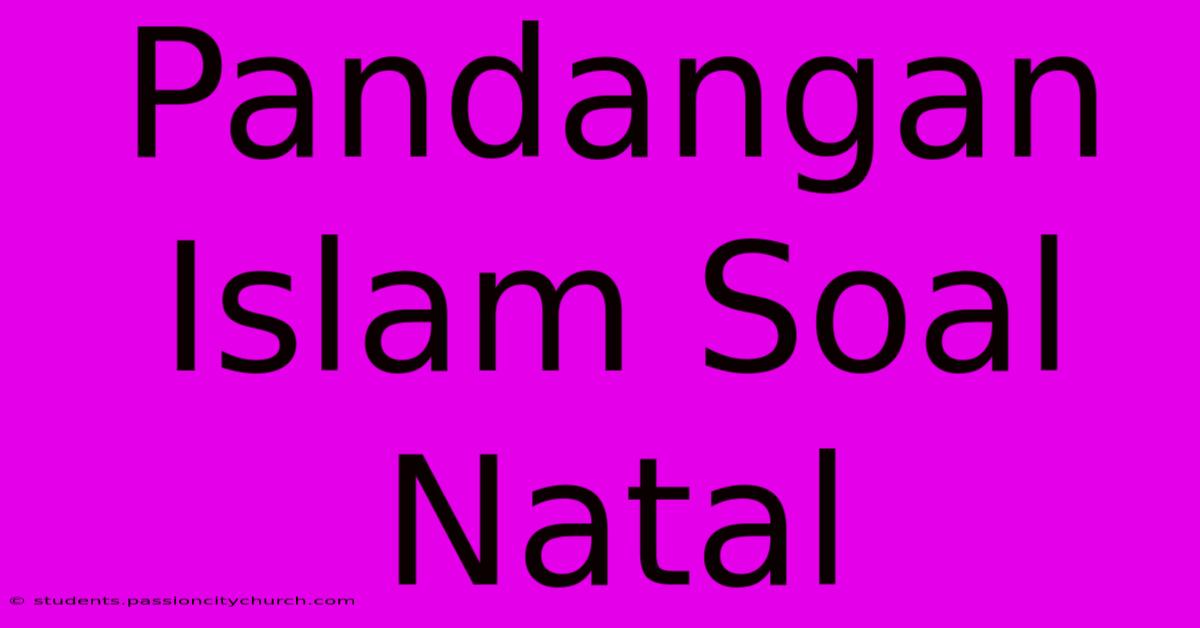Pandangan Islam Soal Natal

Discover more detailed and exciting information on our website. Click the link below to start your adventure: Visit Best Website. Don't miss out!
Table of Contents
Pandangan Islam Soal Natal: Toleransi, Respek, dan Kehidupan Berdampingan
The celebration of Christmas, or Natal, is a significant event for Christians worldwide. In Indonesia, a nation with a large Muslim majority, understanding the Islamic perspective on Natal is crucial for fostering interfaith harmony and peaceful coexistence. This article explores the diverse views within Islam regarding Christmas, emphasizing the importance of tolerance, respect, and understanding in a pluralistic society.
Hukum Merayakan Natal dalam Islam:
There's no explicit prohibition in the Quran or Hadith directly forbidding Muslims from acknowledging or participating in certain aspects of Christmas celebrations. However, the Islamic perspective generally focuses on the theological differences between Islam and Christianity. The core belief in Islam centers on the oneness of God (Allah), while Christianity acknowledges the Trinity. This fundamental difference shapes the Islamic view on celebrating the birth of Jesus (Isa Al-Masih) as depicted in Christian tradition.
Many Islamic scholars emphasize the importance of respecting the beliefs and practices of other faiths. The principle of ukhuwah insaniyah (universal brotherhood) promotes compassion and empathy towards all humankind, regardless of religious affiliation. This principle encourages peaceful coexistence and mutual respect.
Perbedaan Teologis dan Implikasinya:
The theological differences between Islam and Christianity are significant. Muslims believe that Jesus was a prophet of God, but not the son of God as Christians believe. The concept of the Trinity is not accepted in Islam. These differences lead to differing interpretations of the Christmas celebration. While acknowledging Jesus's status as a prophet, Muslims generally do not celebrate his birth as a religious holiday in the same manner as Christians.
However, it's essential to understand that the Islamic view isn't monolithic. Different schools of thought within Islam may have slightly varying interpretations. Some scholars might advocate for a more distanced approach, emphasizing the theological differences and discouraging active participation in Christmas celebrations. Others might adopt a more tolerant perspective, emphasizing the importance of interfaith dialogue and respect for the beliefs of others.
Sikap Toleransi dan Respek dalam Kehidupan Bermasyarakat:
In Indonesia's diverse and pluralistic society, demonstrating tolerance and respect towards other religious communities is paramount. The Indonesian constitution guarantees freedom of religion, and this freedom extends to the right to celebrate religious holidays. The prevailing Islamic perspective in Indonesia often encourages peaceful coexistence and mutual respect, advocating for understanding and tolerance rather than animosity or conflict.
This approach is exemplified by the common practice of Muslims extending greetings (“Selamat Natal”) to their Christian neighbors and colleagues during the Christmas season. This gesture reflects a spirit of goodwill and camaraderie, highlighting the importance of interfaith harmony in fostering a strong and united nation.
Membedakan Antara Toleransi dan Pengakuan:
It's important to distinguish between tolerating the celebration of Christmas and actively participating in it. Tolerance implies acknowledging and respecting the right of others to practice their faith without interference. However, active participation might involve engaging in religious practices that are contrary to Islamic beliefs. This difference is crucial in understanding the nuanced Islamic perspective on Natal.
Many Muslims believe that extending greetings and acknowledging the holiday is a demonstration of good neighborliness and respect for cultural diversity, without compromising their own faith. This approach underscores the importance of maintaining one's religious identity while simultaneously promoting harmony and understanding with those of different faiths.
Menjaga Keharmonisan Antar Umat Beragama:
Maintaining interfaith harmony requires a continuous effort from all religious communities. Open dialogue, mutual understanding, and a willingness to learn about different faiths are essential components of building a cohesive and peaceful society. In Indonesia, the government plays a crucial role in promoting religious tolerance and resolving any potential conflicts that may arise.
Educational initiatives that promote interfaith understanding are essential. Schools and religious institutions can play a significant role in educating the younger generation about the importance of respecting diverse religious beliefs and fostering a culture of tolerance.
Kesimpulan:
The Islamic perspective on Natal is complex and nuanced. While theological differences exist, the prevailing view within Indonesia's Muslim community emphasizes the importance of tolerance, respect, and peaceful coexistence. The focus is on maintaining one's religious identity while demonstrating goodwill and understanding towards other faiths. Extending greetings and acknowledging the significance of Christmas for Christians is viewed as a demonstration of ukhuwah insaniyah – a testament to the shared humanity that transcends religious boundaries. This approach is crucial in building a strong, inclusive, and harmonious society in Indonesia and beyond. The key is to foster mutual respect and understanding, creating a society where diverse religious beliefs can flourish side-by-side without conflict.
Kata Kunci: Pandangan Islam Soal Natal, Toleransi Beragama, Respek Antar Umat Beragama, Natal di Indonesia, Ukhwah Insaniyah, Islam dan Kristen, Kehidupan Berdampingan, Interfaith Harmony, Islam dan Perayaan Natal.

Thank you for visiting our website wich cover about Pandangan Islam Soal Natal. We hope the information provided has been useful to you. Feel free to contact us if you have any questions or need further assistance. See you next time and dont miss to bookmark.
Also read the following articles
| Article Title | Date |
|---|---|
| Bouterse Overleden Reacties Nabestaanden | Dec 26, 2024 |
| Baltimore Ravens Houston Texans Live | Dec 26, 2024 |
| Zdf Helene Fischer Show Gaeste Im Fokus Der Kritik | Dec 26, 2024 |
| Doncics Calf Strain Timberwolves Game | Dec 26, 2024 |
| Kazakhstan Plane Crash 38 Killed Azerbaijan Airlines | Dec 26, 2024 |
| Squid Game Season 2 Coming To Netflix | Dec 26, 2024 |
| Feliz Natal E Prospero Ano Novo Do Sinpro | Dec 26, 2024 |
| Frieden Keimt Auf Weihnachten Bethlehem | Dec 26, 2024 |
| 5 Must See Plays Chiefs Vs Steelers Wednesday | Dec 26, 2024 |
| Chiefs Vs Steelers Highlights Afc Top Seed Secured | Dec 26, 2024 |
